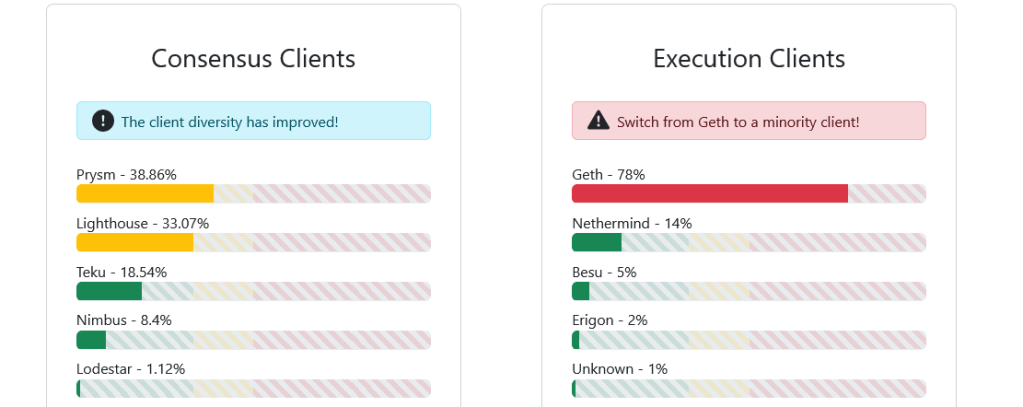Ethereum Staking Provider Dumps Geth For Besu As Client Decentralization Race Heats Up
In a move towards a more diversified Ethereum execution client ecosystem, AllNodes, a staking provider, has announced its complete transition from Geth to Besu. With this shift, AllNodes has eliminated the use of Geth across its entire network of 23,895 nodes, marking a milestone in the ongoing efforts to reduce the current centralization around Geth, a majority client.
AllNodes Migrates To Besu
In a post on X, the non-custodial staking provider said the decision is a testament to the growing recognition of the need for a more robust and decentralized Ethereum ecosystem. Though Geth is the most widely used execution client for Ethereum nodes, analysts are concerned about its dominance and potential security vulnerabilities should it fall prey to a bug.
The transition to Besu aligns with AllNodes’ commitment to providing its clients with the most secure and reliable staking infrastructure. Besu, developed by ConsenSys, is a highly performant and secure execution client offering several advantages over Geth.
This development significantly boosts its decentralization efforts for Rocket Pool, an Ethereum staking protocol that utilizes mini pools. Rocket Pool’s mini pool operators are free to leverage AllNodes’ staking and node hosting services. Even if some of Rocket Pool’s mini-pool operators still use Geth, the decision by AllNodes to switch to Besu further strengthens Ethereum’s resilience against potential client-side failures.

The current landscape of Ethereum validators still heavily favors Geth. Data from Client Diversity shows that over 75% of all validators rely on this client. However, in light of the current realization that client failures can negatively impact the network’s stability, more staking providers will likely diversify their base with others following AllNodes. If more validators are spread across Nethermind, Geth, Besu, and other clients, Ethereum will become more resistant to potential forks and security issues.
No Bailouts For Ethereum Node Operators If Geth Fails
One analyst on X, Marius, explained that anyone can use any client, even gravitating to the first and popular Ethereum execution client, Geth. However, the analyst insists there will be no “bailouts” if the network forks.
A buggy Geth will inevitably expose validators to the risk of catastrophic losses, triggering a network fork since it already controls over 66% of nodes needed for finality. Validators running that client could face slashing penalties of up to 32 ETH, effectively wiping out their stake.
The Ethereum network usually “slashes” the stake of validator nodes should their reliability drop below 100%. The longer they are offline, the higher the slashing penalty.
from Bitcoinist.com https://ift.tt/KAIWiMB
via IFTTT